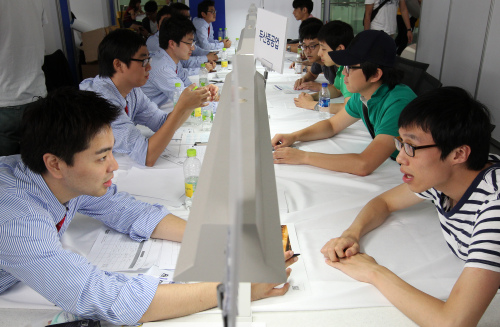More companies focus on interviews in English, rather than results of written testsThe second-half recruitment drive of local firms has begun in earnest with many of the country’s largest firms including Samsung Group, Hyundai Motor Co. and KT Corp. opening applications.
While there is nothing unusual about the timing, this year’s drive stands out from those of previous years in two aspects.
One is the scale.
According to the Federation of Korean Industries, the country’s 30 largest conglomerates will be hiring 124,000 people this year, of which 56,000 will be hired during the remaining months.
In addition, this year local firms have raised the number of high school graduates to be hired by 12 percent to 35,000.
While such developments may be limited to this year, more general changes are apparent in local firms’ hiring methods.
One such change is the adoption of the “open recruitment” policy.
Under the open recruitment policy applications can be submitted regardless of the applicant’s level of education.
Samsung Group, which plans to hire the largest number of new employees this year, is one of the more prominent firms to take this approach.
Under the policy, university graduates who have 3.0 or above grade point average, and who also have a certain level of English proficiency, can apply without having to go through the document review stage, which is usually the first hurdle job seekers have to go through in Korea.

A Seoul university conducts a job fair. (Yonhap News)
Hyosung is another major firm that has discarded the system of dropping applicants according to their age and scores achieved in commonly used English proficiency tests.
Such open policies are also being adopted by 30 state-run companies including Korea Electric Power Corp., also looking to make changes to their human resource management systems to provide more opportunities to high school graduates, and to make them more performance-based.
Another widespread change that appears to be taking hold is the way companies assess the level of English proficiency of candidates.
According to a recent survey conducted by the online job hunting site Incruit.com, the proportion of companies using results of written tests as the main means fell from 83.9 percent last year to 69.9 percent.
In contrast, the proportion of those using interviews conducted in English as the main means rose from 31.9 percent last year to 36.4 percent.
In addition to such general criteria job seekers need to meet, some companies have particular attributes they seek in potential employees.
While most companies have similar criteria such as a “global mind,” and “creativity,” companies also look for more specific qualities.
“There is the standard ideals shown in the website such as a global and creative mindset, knowledge about the industry is also important,” a Hyundai Motor official said.
Other companies such as the steelmaker POSCO look for qualities that are matched to their industries.
“In light of the steel industry’s characteristics, the company prefers a person who has strong sense of responsibility over someone who handles matters as they come,” POSCO said.
“The company also prefers those with consilience, who can create unique values in the global stage where the competition is becoming ever more fierce.”
By Choi He-suk (
cheesuk@heraldcorp.com)






![[Graphic News] More Koreans say they plan long-distance trips this year](http://res.heraldm.com/phpwas/restmb_idxmake.php?idx=645&simg=/content/image/2024/04/17/20240417050828_0.gif&u=)